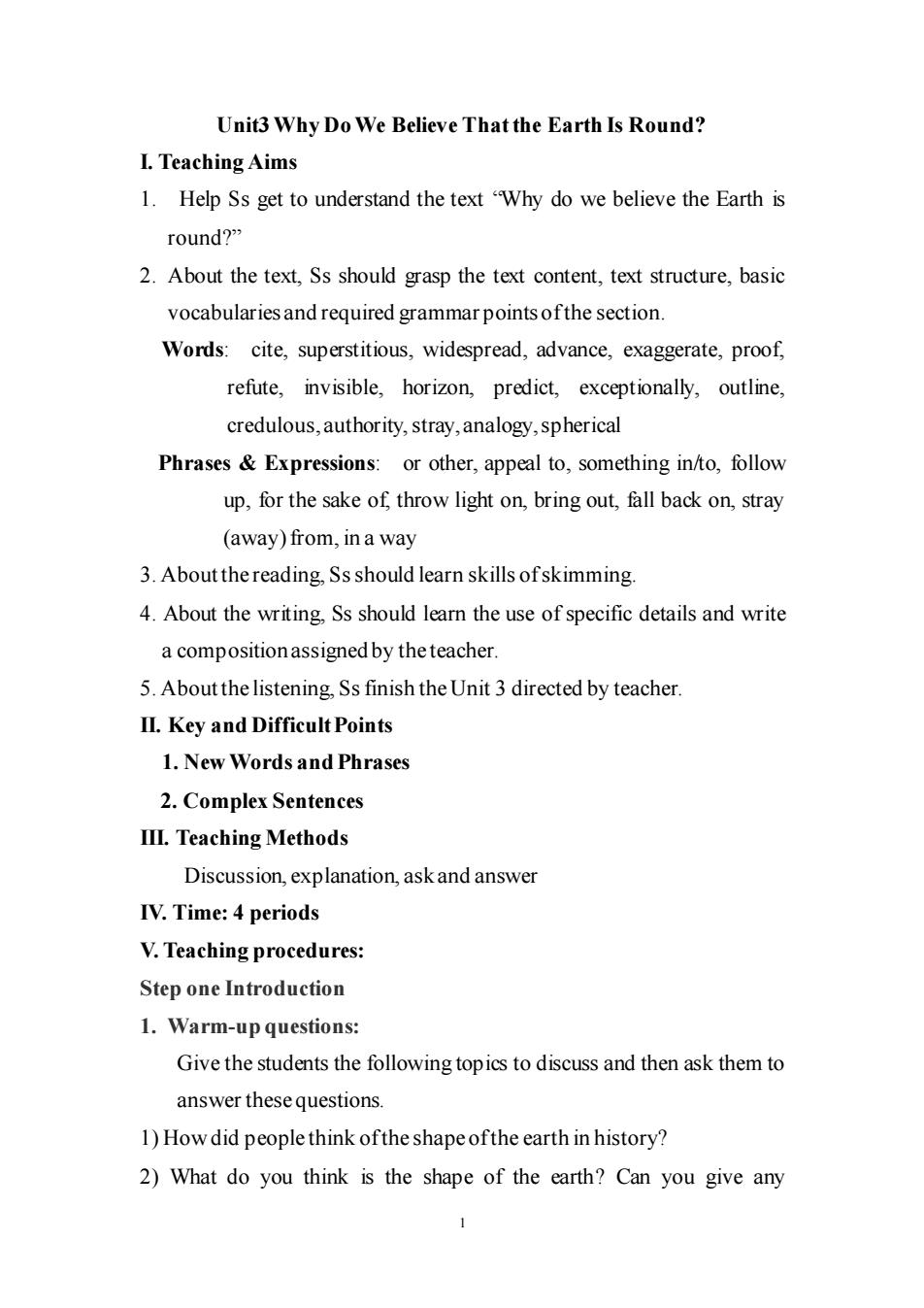
Unit3 Why Do We Believe That the Earth Is Round? I.Teaching Aims 1.Help Ss get to understand the text "Why do we believe the Earth is round?" 2.About the text,Ss should grasp the text content,text structure,basic vocabularies and required grammar points ofthe section. Words:cite,superstitious,widespread,advance,exaggerate,proof refute,invisible,horizon,predict,exceptionally,outline, credulous,authority,stray,analogy,spherical Phrases &Expressions:or other,appeal to,something in/to,follow up,for the sake of throw light on,bring out,fall back on.stray (away)from,in a way 3.About the reading.Ss should learn skills ofskimming. 4.About the writing.Ss should learn the use of specific details and write a compositionassigned by the teacher. 5.About the listening,Ss finish the Unit 3 directed by teacher II.Key and Difficult Points 1.New Words and Phrases 2.Complex Sentences III.Teaching Methods Discussion,explanation,ask and answer IV.Time:4 periods V.Teaching procedures: Step one Introduction 1.Warm-up questions: Give the students the following topics to discuss and then ask them to answer these questions. 1)How did people think ofthe shape ofthe earth in history? 2)What do you think is the shape of the earth?Can you give any
1 Unit3 Why Do We Believe That the Earth Is Round? I. Teaching Aims 1. Help Ss get to understand the text “Why do we believe the Earth is round?” 2. About the text, Ss should grasp the text content, text structure, basic vocabularies and required grammar points of the section. Words: cite, superstitious, widespread, advance, exaggerate, proof, refute, invisible, horizon, predict, exceptionally, outline, credulous, authority, stray, analogy, spherical Phrases & Expressions: or other, appeal to, something in/to, follow up, for the sake of, throw light on, bring out, fall back on, stray (away) from, in a way 3. About the reading, Ss should learn skills of skimming. 4. About the writing, Ss should learn the use of specific details and write a composition assigned by the teacher. 5. About the listening, Ss finish the Unit 3 directed by teacher. II. Key and Difficult Points 1. New Words and Phrases 2. Complex Sentences III. Teaching Methods Discussion, explanation, ask and answer IV. Time: 4 periods V. Teaching procedures: Step one Introduction 1. Warm-up questions: Give the students the following topics to discuss and then ask them to answer these questions. 1) How did people think of the shape of the earth in history? 2) What do you think is the shape of the earth? Can you give any
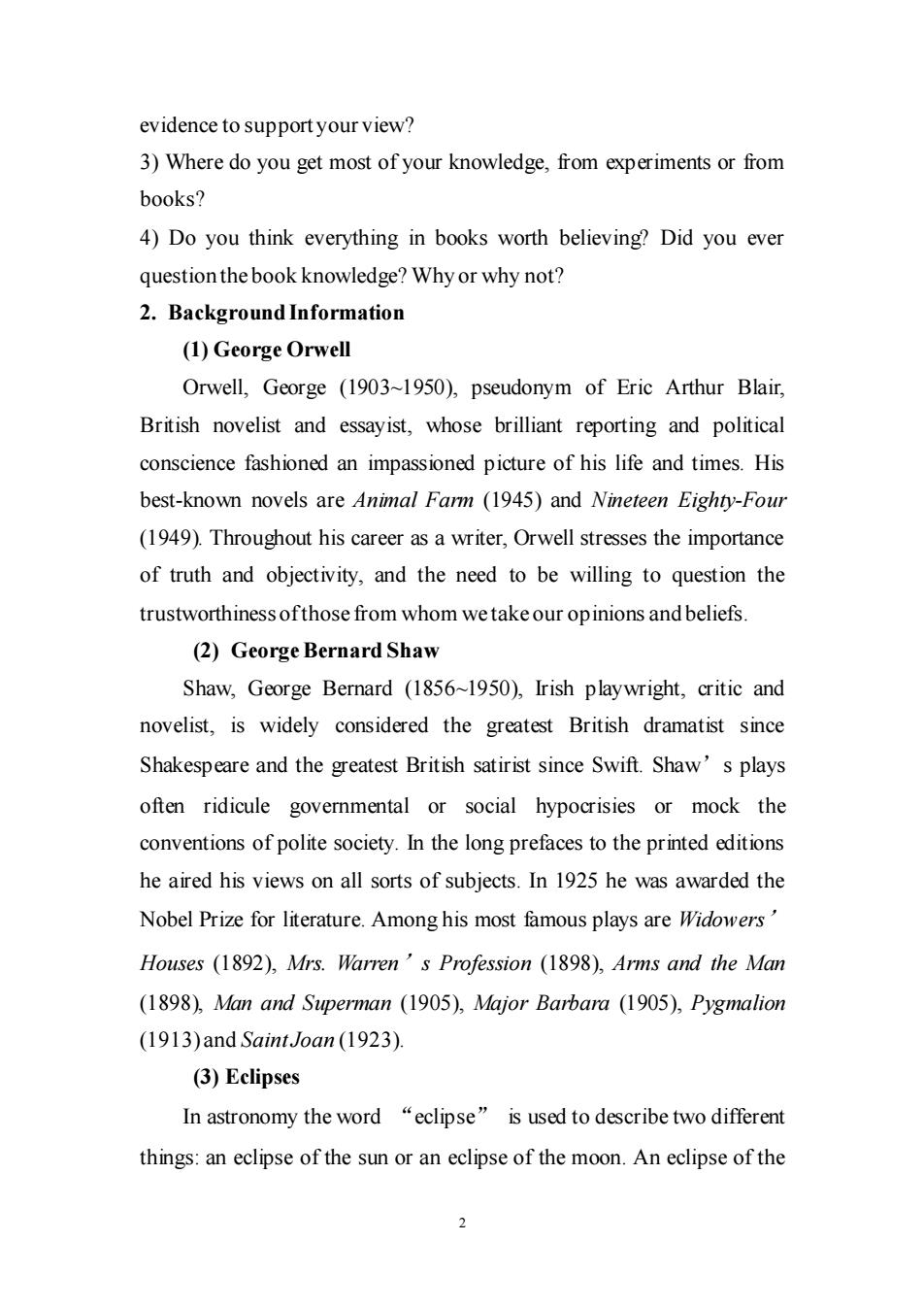
evidence to supportyour view? 3)Where do you get most of your knowledge,from experiments or from books? 4)Do you think everything in books worth believing?Did you ever question the book knowledge?Why or why not? 2.Background Information (1)George Orwell Orwell,George (1903~1950),pseudonym of Eric Arthur Blair, British novelist and essayist,whose brilliant reporting and political conscience fashioned an impassioned picture of his life and times.His best-known novels are Animal Fam (1945)and Nineteen Eighty-Four (1949).Throughout his career as a writer,Orwell stresses the importance of truth and objectivity,and the need to be willing to question the trustworthiness ofthose from whom wetakeour opinions and beliefs. (2)George Bernard Shaw Shaw,George Bernard (1856~1950),Irish playwright,critic and novelist,is widely considered the greatest British dramatist since Shakespeare and the greatest British satirist since Swift.Shaw's plays often ridicule governmental or social hypocrisies or mock the conventions of polite society.In the long prefaces to the printed editions he aired his views on all sorts of subjects.In 1925 he was awarded the Nobel Prize for literature.Among his most famous plays are Widowers Houses (1892),Mrs.Warren's Profession (1898),Arms and the Man (1898),Man and Superman (1905),Major Barbara (1905),Pygmalion (1913)and SaintJoan (1923) (3)Eclipses In astronomy the word "eclipse"is used to describe two different things:an eclipse of the sun or an eclipse of the moon.An eclipse of the 2
2 evidence to support your view? 3) Where do you get most of your knowledge, from experiments or from books? 4) Do you think everything in books worth believing? Did you ever question the book knowledge? Why or why not? 2. Background Information (1) George Orwell Orwell, George (1903~1950), pseudonym of Eric Arthur Blair, British novelist and essayist, whose brilliant reporting and political conscience fashioned an impassioned picture of his life and times. His best-known novels are Animal Farm (1945) and Nineteen Eighty-Four (1949). Throughout his career as a writer, Orwell stresses the importance of truth and objectivity, and the need to be willing to question the trustworthiness of those from whom we take our opinions and beliefs. (2) George Bernard Shaw Shaw, George Bernard (1856~1950), Irish playwright, critic and novelist, is widely considered the greatest British dramatist since Shakespeare and the greatest British satirist since Swift. Shaw’s plays often ridicule governmental or social hypocrisies or mock the conventions of polite society. In the long prefaces to the printed editions he aired his views on all sorts of subjects. In 1925 he was awarded the Nobel Prize for literature. Among his most famous plays are Widowers’ Houses (1892), Mrs. Warren’s Profession (1898), Arms and the Man (1898), Man and Superman (1905), Major Barbara (1905), Pygmalion (1913) and Saint Joan (1923). (3) Eclipses In astronomy the word “eclipse” is used to describe two different things: an eclipse of the sun or an eclipse of the moon. An eclipse of the

sun is called a solar eclipse ()It occurs when the moon passes directly in front of the sun.As seen from various points on the earth,the moon blocks out the sun.An eclipse ofthe moon is called a lunar eclipse )It occurs when the full moon passes behind the earth into the earth's shadow.Within the shadow the moon is no longer directly lighted by the sun.When the whole moon or the whole sun is eclipsed,we speak of a total eclipse ()When only part of the moon or sun is eclipsed. we speak ofa partial eclipse(偏食) (4)Playing Cards A pack of ordinary playing cards consists of four 13-card suits: clubs,diamonds,hearts,and spades.Each suit contains a king queen. jack,and 10 cards assigned numbers from 1 to 10.The 1-card is known as an ace.An order of rank for the various cards within a suit is established for each game.In bridge,for instance,ace is the highest,followed by the king,queen,etc. 3.Introductory Remarks Why Do We Believe That the Earth Is Round"is one of a series of short essays Orwell wrote for British periodicals in the 1940's.In it he first tries to refute both the Flat Earth theory and the Oval Earth theory but says that his reasons for thinking that the earth is round are rather weak and precarious.Then from the discussion he draws his conclusion that ours is a credulous age because much of our knowledge does not rest on reasoning or on experiment,but on authority.Here Orwell expresses a healthy concern for the burden the ordinary newspaper-reading citizen carries.Overloaded with information and misinformation,the average man cannot adequately process and digest what he receives.He is apt to accept what he hears or reads as true without submitting it to factual verification or the test of reason.Man should respect the views of true
3 sun is called a solar eclipse (日食). It occurs when the moon passes directly in front of the sun. As seen from various points on the earth, the moon blocks out the sun. An eclipse of the moon is called a lunar eclipse (月食). It occurs when the full moon passes behind the earth into the earth’s shadow. Within the shadow the moon is no longer directly lighted by the sun. When the whole moon or the whole sun is eclipsed, we speak of a total eclipse (全食). When only part of the moon or sun is eclipsed, we speak of a partial eclipse (偏食). (4) Playing Cards A pack of ordinary playing cards consists of four 13-card suits: clubs, diamonds, hearts, and spades. Each suit contains a king, queen, jack, and 10 cards assigned numbers from 1 to 10. The 1-card is known as an ace. An order of rank for the various cards within a suit is established for each game. In bridge, for instance, ace is the highest, followed by the king, queen, etc. 3. Introductory Remarks “Why Do We Believe That the Earth Is Round” is one of a series of short essays Orwell wrote for British periodicals in the 1940’s. In it he first tries to refute both the Flat Earth theory and the Oval Earth theory but says that his reasons for thinking that the earth is round are rather weak and precarious. Then from the discussion he draws his conclusion that ours is a credulous age because much of our knowledge does not rest on reasoning or on experiment, but on authority. Here Orwell expresses a healthy concern for the burden the ordinary newspaper-reading citizen carries. Overloaded with information and misinformation, the average man cannot adequately process and digest what he receives. He is apt to accept what he hears or reads as true without submitting it to factual verification or the test of reason. Man should respect the views of true
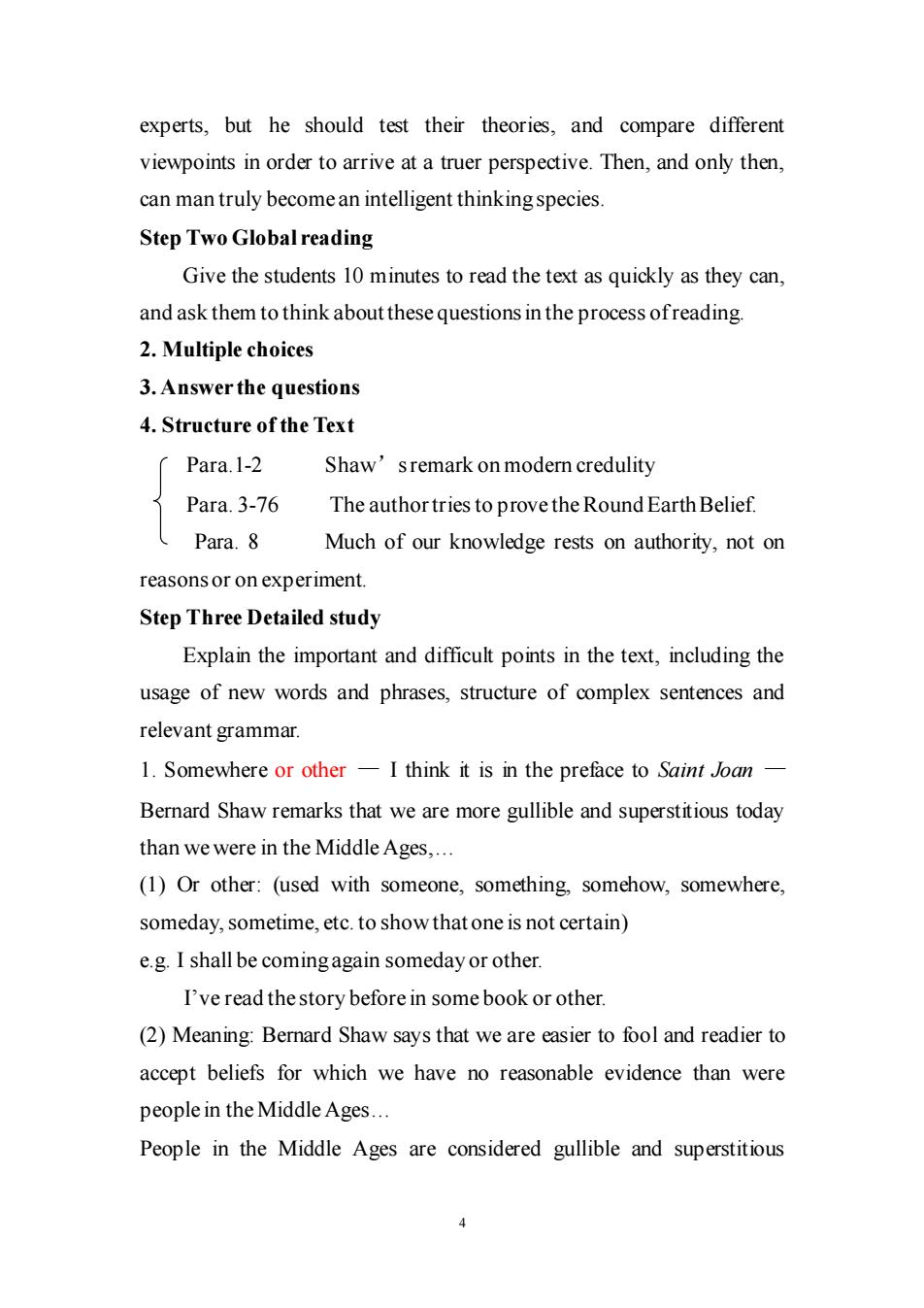
experts,but he should test their theories,and compare different viewpoints in order to arrive at a truer perspective.Then,and only then, can man truly becomean intelligent thinkingspecies. Step Two Global reading Give the students 10 minutes to read the text as quickly as they can, and ask them to think about these questions in the process ofreading. 2.Multiple choices 3.Answer the questions 4.Structure of the Text Para.1-2 Shaw'sremark onmodern credulity Para.3-76 The author tries to prove the Round Earth Belief. Para.8 Much of our knowledge rests on authority,not on reasonsor on experiment. Step Three Detailed study Explain the important and difficult points in the text,including the usage of new words and phrases,structure of complex sentences and relevant grammar. 1.Somewhere or other -I think it is in the preface to Saint Joan Bernard Shaw remarks that we are more gullible and superstitious today than we were in the Middle Ages,... (1)Or other:(used with someone,something,somehow,somewhere, someday,sometime,etc.to show that one is not certain) e.g.Ishall be comingagain someday or other. I've read the story before in some book or other. (2)Meaning:Bernard Shaw says that we are easier to fool and readier to accept beliefs for which we have no reasonable evidence than were people in the Middle Ages... People in the Middle Ages are considered gullible and superstitious 4
4 experts, but he should test their theories, and compare different viewpoints in order to arrive at a truer perspective. Then, and only then, can man truly become an intelligent thinking species. Step Two Global reading Give the students 10 minutes to read the text as quickly as they can, and ask them to think about these questions in the process of reading. 2. Multiple choices 3. Answer the questions 4. Structure of the Text Para.1-2 Shaw’s remark on modern credulity Para. 3-76 The author tries to prove the Round Earth Belief. Para. 8 Much of our knowledge rests on authority, not on reasons or on experiment. Step Three Detailed study Explain the important and difficult points in the text, including the usage of new words and phrases, structure of complex sentences and relevant grammar. 1. Somewhere or other — I think it is in the preface to Saint Joan — Bernard Shaw remarks that we are more gullible and superstitious today than we were in the Middle Ages,… (1) Or other: (used with someone, something, somehow, somewhere, someday, sometime, etc. to show that one is not certain) e.g. I shall be coming again someday or other. I’ve read the story before in some book or other. (2) Meaning: Bernard Shaw says that we are easier to fool and readier to accept beliefs for which we have no reasonable evidence than were people in the Middle Ages… People in the Middle Ages are considered gullible and superstitious
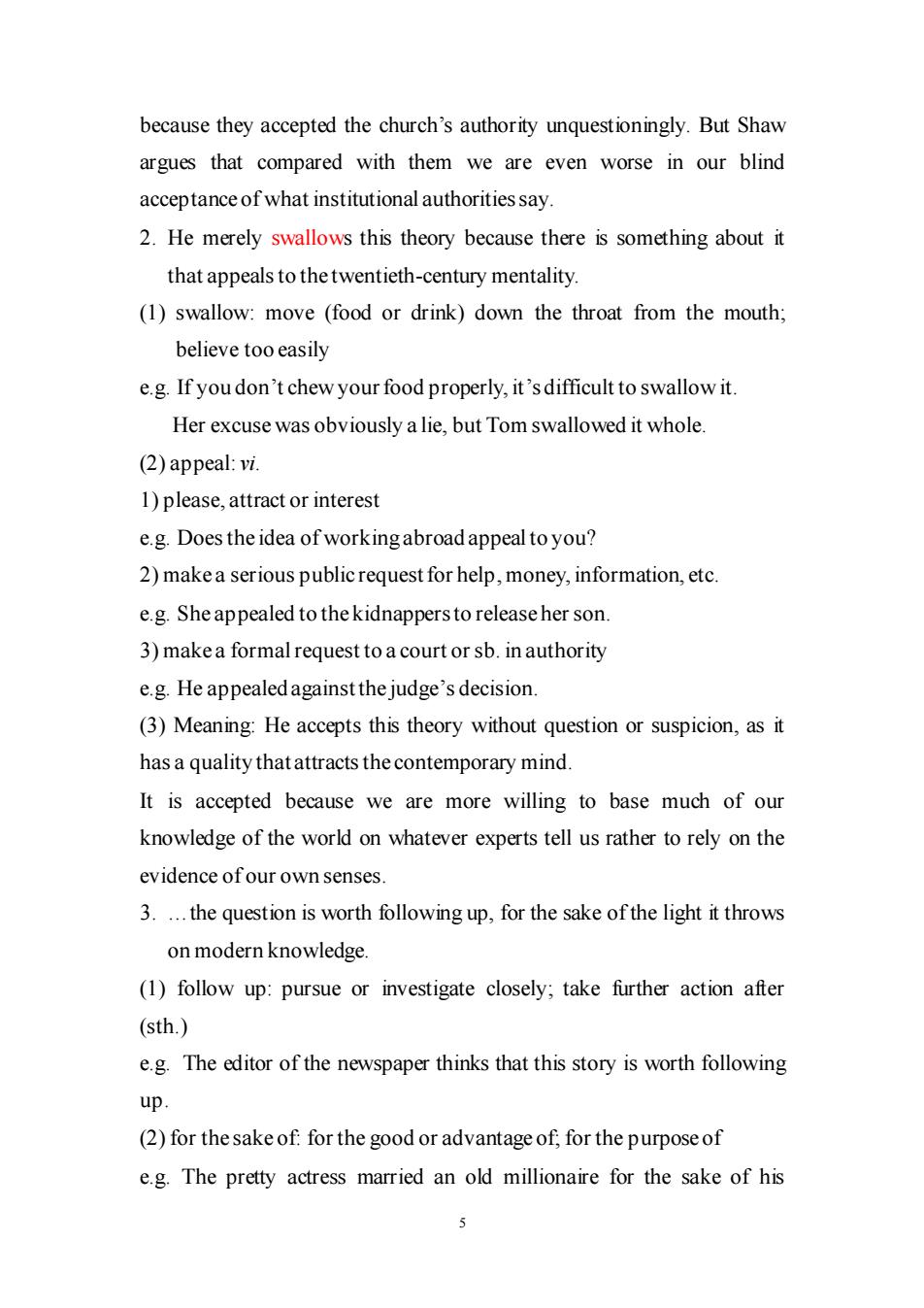
because they accepted the church's authority unquestioningly.But Shaw argues that compared with them we are even worse in our blind acceptance of what institutional authorities say. 2.He merely swallows this theory because there is something about it that appeals to thetwentieth-century mentality. (1)swallow:move (food or drink)down the throat from the mouth; believe tooeasily e.g.If you don't chew your food properly,it's difficult to swallow it. Her excuse was obviously a lie,but Tom swallowed it whole. (2)appeal:vi. 1)please,attract or interest e.g.Does the idea of workingabroad appeal to you? 2)makea serious publicrequest for help,money,information,etc. e.g.She appealed to thekidnappersto release her son 3)makea formal request to a court or sb.in authority e.g.He appealed against the judge's decision. (3)Meaning:He accepts this theory without question or suspicion,as it has a quality that attracts the contemporary mind. It is accepted because we are more willing to base much of our knowledge of the world on whatever experts tell us rather to rely on the evidence ofour own senses. 3....the question is worth following up,for the sake of the light it throws on modern knowledge. (1)follow up:pursue or investigate closely;take further action after (sth.) e.g.The editor of the newspaper thinks that this story is worth following p (2)for the sake of:for the good or advantage of;for the purpose of e.g.The pretty actress married an old millionaire for the sake of his
5 because they accepted the church’s authority unquestioningly. But Shaw argues that compared with them we are even worse in our blind acceptance of what institutional authorities say. 2. He merely swallows this theory because there is something about it that appeals to the twentieth-century mentality. (1) swallow: move (food or drink) down the throat from the mouth; believe too easily e.g. If you don’t chew your food properly, it’s difficult to swallow it. Her excuse was obviously a lie, but Tom swallowed it whole. (2) appeal: vi. 1) please, attract or interest e.g. Does the idea of working abroad appeal to you? 2) make a serious public request for help, money, information, etc. e.g. She appealed to the kidnappers to release her son. 3) make a formal request to a court or sb. in authority e.g. He appealed against the judge’s decision. (3) Meaning: He accepts this theory without question or suspicion, as it has a quality that attracts the contemporary mind. It is accepted because we are more willing to base much of our knowledge of the world on whatever experts tell us rather to rely on the evidence of our own senses. 3. …the question is worth following up, for the sake of the light it throws on modern knowledge. (1) follow up: pursue or investigate closely; take further action after (sth.) e.g. The editor of the newspaper thinks that this story is worth following up. (2) for the sake of: for the good or advantage of; for the purpose of e.g. The pretty actress married an old millionaire for the sake of his

money. (3)throw light on:make clear;explain e.g.These new discoveries may throwlight on the origins of the universe. (4)Meaning:and the question is worth discussing further because of what it may reveal about the validity ofpresent-day beliefs 4.As for the Flat Earththeory,I believe I could refute it. refute:vt.prove (a statement)to be untrue;prove (a person)to be mistaken e.g.How would you refute the theory that the earth is flat? The best way to refute the accusation oflaziness is to work hard. 5....you can see the masts and funnels of invisible ships passing along the horizon horizon:n. 1)the line where theearth or sea seems to meet the sky e.g.We could see a ship on the horizon 2)the limit ofone's ideas,knowledge,experience eg.Judging by his narrow political horizons,he is not suitable for the post. Collocation: broaden/,expand one's horizons开阔眼界 rise above/sink below thehorizon从地平线升起/落下 on the horizon 在地平线上 6.But it does not follow that the earth is spherical. (1)follow:be or happen as anecessary effect or result e.g.He is a good writer,but it does not follow that he is a good speaker. Because he is a competent engineer,it does not follow that he will make a successful factory director (2)Meaning:But you can not reason from this that the earth is spherical. 6
6 money. (3) throw light on: make clear; explain e.g. These new discoveries may throw light on the origins of the universe. (4) Meaning: and the question is worth discussing further because of what it may reveal about the validity of present-day beliefs. 4. As for the Flat Earth theory, I believe I could refute it. refute: vt. prove (a statement) to be untrue; prove (a person) to be mistaken e.g. How would you refute the theory that the earth is flat? The best way to refute the accusation of laziness is to work hard. 5. …you can see the masts and funnels of invisible ships passing along the horizon. horizon: n. 1) the line where the earth or sea seems to meet the sky e.g. We could see a ship on the horizon. 2) the limit of one’s ideas, knowledge, experience e.g. Judging by his narrow political horizons, he is not suitable for the post. Collocation: broaden / expand one’s horizons 开阔眼界 rise above / sink below the horizon 从地平线升起/落下 on the horizon 在地平线上 6. But it does not follow that the earth is spherical. (1) follow: be or happen as a necessary effect or result e.g. He is a good writer, but it does not follow that he is a good speaker. Because he is a competent engineer, it does not follow that he will make a successful factory director. (2)Meaning: But you can not reason from this that the earth is spherical
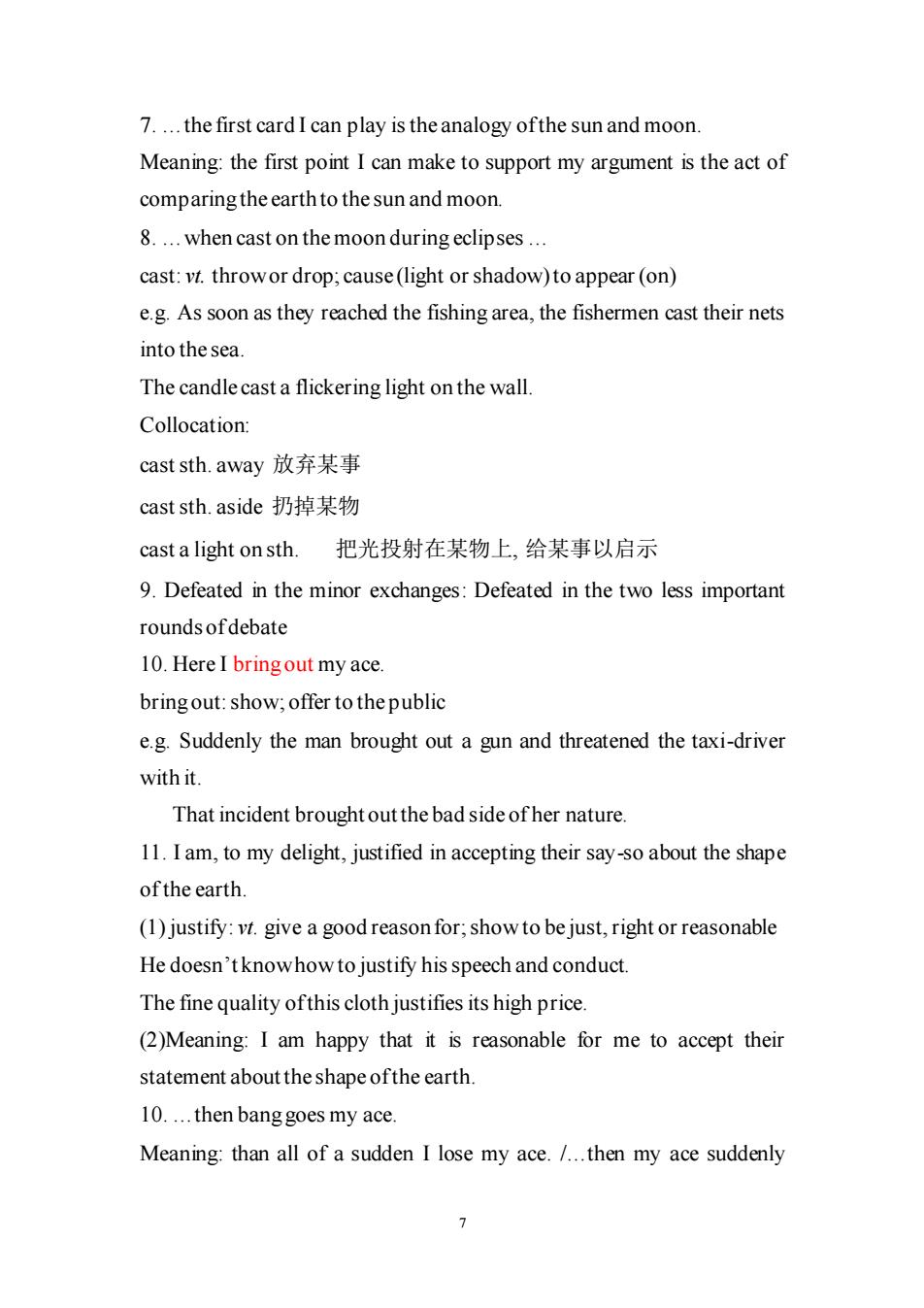
7....the first card I can play is the analogy ofthe sun and moon. Meaning:the first point I can make to support my argument is the act of comparing the earth to the sun and moon. 8....when cast on the moon during eclipses... cast:vt.throwor drop;cause(light or shadow)to appear(on) e.g.As soon as they reached the fishing area,the fishermen cast their nets into the sea. The candle cast a flickering light on the wall. Collocation: cast sth.away放弃某事 cast sth.aside扔掉某物 cast a light on sth. 把光投射在某物上,给某事以启示 9.Defeated in the minor exchanges:Defeated in the two less important roundsofdebate 10.Here I bringout my ace. bringout:show;offer to thepublic e.g.Suddenly the man brought out a gun and threatened the taxi-driver with it. That incident brought out the bad side ofher nature 11.Iam,to my delight,justified in accepting their say-so about the shape ofthe earth. (1)justify:vt.give a good reason for;showto bejust,right or reasonable He doesn'tknowhow to justify his speech and conduct. The fine quality ofthis cloth justifies its high price. (2)Meaning:I am happy that it is reasonable for me to accept their statement about the shape ofthe earth. 10....then banggoes my ace. Meaning:than all of a sudden I lose my ace./...then my ace suddenly
7 7. …the first card I can play is the analogy of the sun and moon. Meaning: the first point I can make to support my argument is the act of comparing the earth to the sun and moon. 8. …when cast on the moon during eclipses … cast: vt. throw or drop; cause (light or shadow) to appear (on) e.g. As soon as they reached the fishing area, the fishermen cast their nets into the sea. The candle cast a flickering light on the wall. Collocation: cast sth. away 放弃某事 cast sth. aside 扔掉某物 cast a light on sth. 把光投射在某物上, 给某事以启示 9. Defeated in the minor exchanges: Defeated in the two less important rounds of debate 10. Here I bring out my ace. bring out: show; offer to the public e.g. Suddenly the man brought out a gun and threatened the taxi-driver with it. That incident brought out the bad side of her nature. 11. I am, to my delight, justified in accepting their say-so about the shape of the earth. (1) justify: vt. give a good reason for; show to be just, right or reasonable He doesn’t know how to justify his speech and conduct. The fine quality of this cloth justifies its high price. (2)Meaning: I am happy that it is reasonable for me to accept their statement about the shape of the earth. 10. …then bang goes my ace. Meaning: than all of a sudden I lose my ace. /…then my ace suddenly

loses its effectiveness,as though it had been cut to shreds. If you say bang goes something you mean it suddenly becomes obvious that it can not now succeed,be achieved or accomplished. e.g.The dog has eaten our food-bang goes dinner I've broken my leg!For sure,banggoes playing football now. 11.I believe that finishes the Oval Earth man,.. Meaning:I believe this last argument of mine completely defeats the Oval Earth man,… 12.It will be seen that my reasons for thinking that the earth is round are rather precarious ones. Meaning:My reasons for thinking that the earth is round is not well-grounded.Here Orwell admits that the evidence he provides is not enough to establish his beliefs beyond any doubt. 9.I should have to fall back on theexpert much earlier Fall back on:turn to for support e.g.He is a man to fall back on in an emergency If this plan fails,thereareother plans we can fall back on. 10.And much the greater part ofour knowledge is at this level. Meaning:by far thegreater part ofour knowledge is at this level 11.It does not rest on reasoningor on experiment,but on authority. (1)Rest on:rely on;be based on e.g.Success in management ultimately rests on good judgment Columbus's decision to sail west to reach the East rested on his belief that the earth wasround (2)Meaning:Much of our knowledge is not based on thinking logically and drawing conclusions from facts or on doing experiments,but on the opinionsofexperts. 12....he strays away from his own specialty Stray away from:wander away from;leave(a subject) 8
8 loses its effectiveness, as though it had been cut to shreds. If you say bang goes something you mean it suddenly becomes obvious that it can not now succeed, be achieved or accomplished. e.g. The dog has eaten our food—bang goes dinner. I’ve broken my leg! For sure, bang goes playing football now. 11. I believe that finishes the Oval Earth man, … Meaning: I believe this last argument of mine completely defeats the Oval Earth man, … 12. It will be seen that my reasons for thinking that the earth is round are rather precarious ones. Meaning: My reasons for thinking that the earth is round is not well-grounded. Here Orwell admits that the evidence he provides is not enough to establish his beliefs beyond any doubt. 9. I should have to fall back on the expert much earlier Fall back on: turn to for support e.g. He is a man to fall back on in an emergency. If this plan fails, there are other plans we can fall back on. 10. And much the greater part of our knowledge is at this level. Meaning: by far the greater part of our knowledge is at this level. 11. It does not rest on reasoning or on experiment, but on authority. (1) Rest on: rely on; be based on e.g. Success in management ultimately rests on good judgment Columbus’s decision to sail west to reach the East rested on his belief that the earth was round. (2) Meaning: Much of our knowledge is not based on thinking logically and drawing conclusions from facts or on doing experiments, but on the opinions of experts. 12. …he strays away from his own specialty Stray away from: wander away from; leave (a subject)
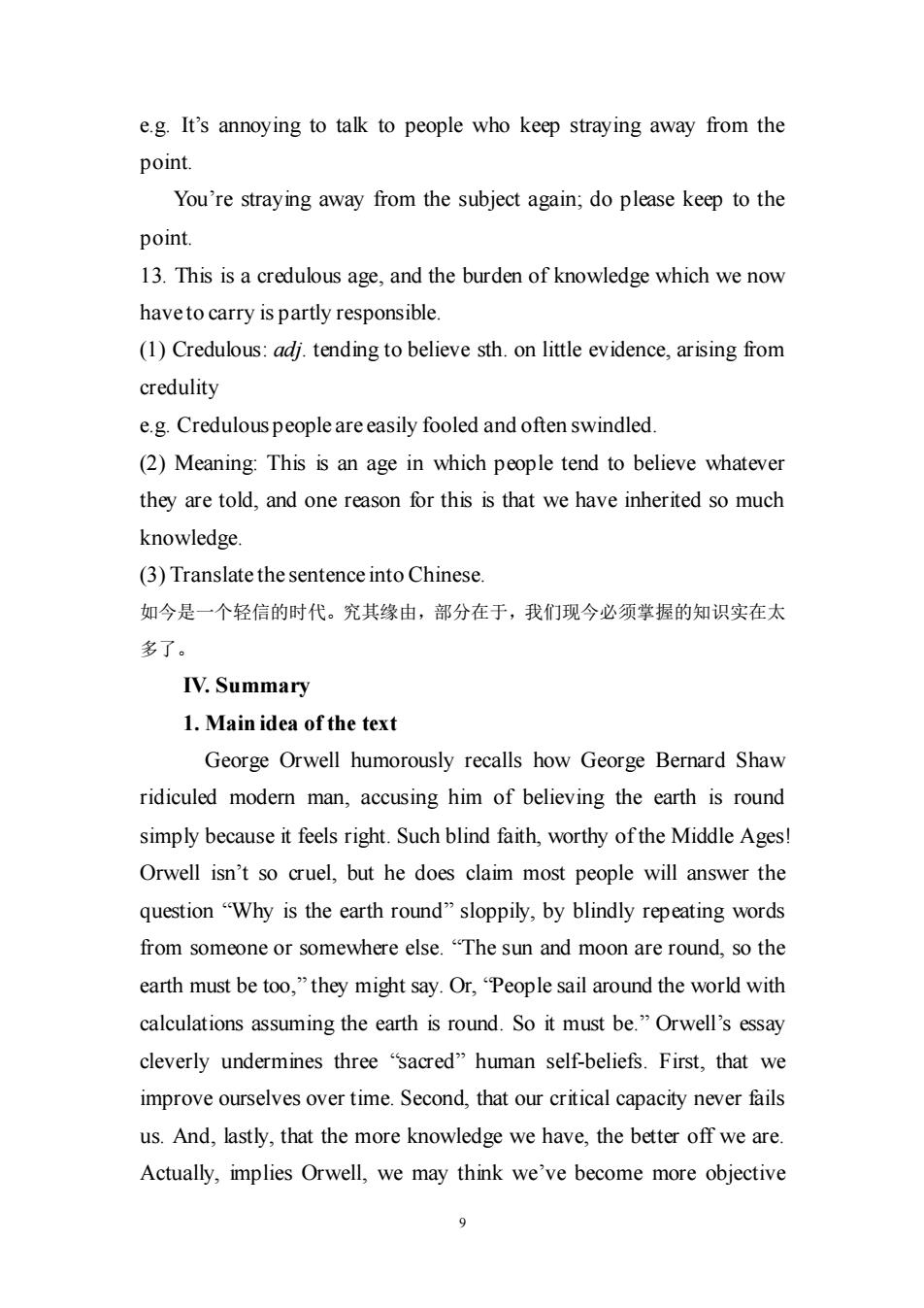
e.g.It's annoying to talk to people who keep straying away from the point. You're straying away from the subject again;do please keep to the point 13.This is a credulous age,and the burden of knowledge which we now haveto carry is partly responsible. (1)Credulous:adj.tending to believe sth.on little evidence,arising from credulity e.g.Credulous peopleare easily fooled and often swindled. (2)Meaning:This is an age in which people tend to believe whatever they are told,and one reason for this is that we have inherited so much knowledge. (3)Translate the sentence into Chinese. 如今是一个轻信的时代。究其缘由,部分在于,我们现今必须掌握的知识实在太 多了。 IV.Summary 1.Main idea of the text George Orwell humorously recalls how George Bernard Shaw ridiculed modern man,accusing him of believing the earth is round simply because it feels right.Such blind faith,worthy ofthe Middle Ages! Orwell isn't so cruel,but he does claim most people will answer the question "Why is the earth round"sloppily,by blindly repeating words from someone or somewhere else."The sun and moon are round,so the earth must be too,"they might say.Or,"People sail around the world with calculations assuming the earth is round.So it must be."Orwell's essay cleverly undermines three 'sacred"human self-beliefs.First,that we improve ourselves over time.Second,that our critical capacity never fails us.And,lastly,that the more knowledge we have,the better off we are. Actually,implies Orwell,we may think we've become more objective 9
9 e.g. It’s annoying to talk to people who keep straying away from the point. You’re straying away from the subject again; do please keep to the point. 13. This is a credulous age, and the burden of knowledge which we now have to carry is partly responsible. (1) Credulous: adj. tending to believe sth. on little evidence, arising from credulity e.g. Credulous people are easily fooled and often swindled. (2) Meaning: This is an age in which people tend to believe whatever they are told, and one reason for this is that we have inherited so much knowledge. (3) Translate the sentence into Chinese. 如今是一个轻信的时代。究其缘由,部分在于,我们现今必须掌握的知识实在太 多了。 IV. Summary 1. Main idea of the text George Orwell humorously recalls how George Bernard Shaw ridiculed modern man, accusing him of believing the earth is round simply because it feels right. Such blind faith, worthy of the Middle Ages! Orwell isn’t so cruel, but he does claim most people will answer the question “Why is the earth round” sloppily, by blindly repeating words from someone or somewhere else. “The sun and moon are round, so the earth must be too,” they might say. Or, “People sail around the world with calculations assuming the earth is round. So it must be.” Orwell’s essay cleverly undermines three “sacred” human self-beliefs. First, that we improve ourselves over time. Second, that our critical capacity never fails us. And, lastly, that the more knowledge we have, the better off we are. Actually, implies Orwell, we may think we’ve become more objective

and scientific,but we're still plenty naive and vulnerable to superstition and hearsay.We may believe we like facts,and know how to find them out,but we don't.We say it's important to tell true from false,but we make little effort to do so.In short,people today do not turn enough to reason or argument,but usually fall back on others'authority.Most simply say,"Everyone knows."Orwell concludes that "this is a credulous age,"partly because there's just too much knowledge around to handle responsibly. 2.Words and Expressions V.Homework 1.Memorize the new words and phrases in the text. 2.Doexercises on p57-68 3.Learn thetext in"Reading Activity"by yourself. 4.Write a composition on the topic Why Should We Attach Importance to Both Theory and Practice?You should write at least 150 words based on the outline given in Chinese below: 1.Theory is based on practice 2.Theory,in turn,serves practice 3.Conclusion VI.References 1.College English Intensive Reading 4,LinYinhua(ed.),Shanghai Foreign Language Education Press,2006 2.College English Intensive Reading 4,(Teacher's Book),Zhang Zengjian(ed.),Shanghai Foreign Language Education Press,2006. 3.Oxford Advanced Learner's English-Chinese Dictionary (6h edition),Oxford university press&The Commercial Press,2004. 4.大学英语语法.薄冰主编.山西:山西教育出版社,2006 5.大学英语实用语法讲解与练习.任福洪等主编.北京:国防工
10 and scientific, but we’re still plenty naive and vulnerable to superstition and hearsay. We may believe we like facts, and know how to find them out, but we don’t. We say it’s important to tell true from false, but we make little effort to do so. In short, people today do not turn enough to reason or argument, but usually fall back on others’ authority. Most simply say, “Everyone knows.” Orwell concludes that “this is a credulous age,” partly because there’s just too much knowledge around to handle responsibly. 2. Words and Expressions V. Homework 1. Memorize the new words and phrases in the text. 2. Do exercises on p57-68 3. Learn the text in “Reading Activity” by yourself. 4. Write a composition on the topic Why Should We Attach Importance to Both Theory and Practice? You should write at least 150 words based on the outline given in Chinese below: 1.Theory is based on practice 2.Theory, in turn, serves practice 3. Conclusion VI.References 1. College English Intensive Reading 4, LinYinhua(ed.), Shanghai Foreign Language Education Press, 2006. 2. College English Intensive Reading 4, (Teacher’s Book), Zhang Zengjian(ed.), Shanghai Foreign Language Education Press, 2006. 3. Oxford Advanced Learner’s English-Chinese Dictionary(6 th edition), Oxford university press﹠The Commercial Press, 2004. 4. 大学英语语法. 薄冰 主编. 山西:山西教育出版社,2006. 5. 大学英语实用语法讲解与练习. 任福洪等主编. 北京:国防工